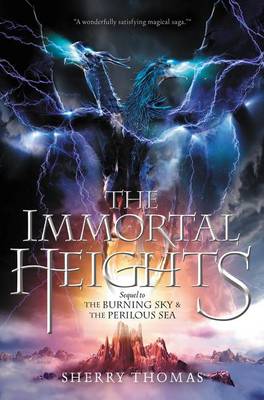Reviewed by ladygrey on
The world Thomas has created is detailed and interesting enough. It deepens and spins in sometimes obviously convenient ways, but gets away with it by adhering to the new rules set forth.
I think I enjoyed Titus the most in the first book when he is a noble, fierce liar and manipulator and imminently capable. It's complicated and interesting. He has his moments in the second book, where he mocks how love-struck he has become; when he is brazenly arrogant with a cavalier grace. In the third book... he is so serious and sincere. Mostly. It is understandable, given the circumstances, but changes the energy of the story.
Kashkari, who I enjoyed in the first book, plays his role but never completely develops enough to warrant my affections. In fact, none of the other characters, either secondary or tertiary, for all their back stories and machinations gave me much to latch onto. Iolanthe even says it in a moment, how she had not yet considered Amara as an actual human being and such is the case for most of the characters. Characters are almost more interesting when they have no back story but live and breathe by their reactions and dialog. With only a few exceptions.
Iolanthe was a good match for Titus. I liked that she is clever and determined and surprising and occasionally funny. But there isn't much room for her or Titus to grow in this book. There is far too much to do and to explain and so while they have plenty of time together, by and large, it feels like they keep saying the same things.
And one third of what they keep saying I simply couldn't relate to; this utterly prosaic idea of life on the other side of the end of the world. Perhaps I understood why they would dream of normalcy, why she would hold to a dream she had before the first book began, to a vestige of hope that anchored her to the life she had wanted instead if this turbulent destiny. But instead of creating this beautiful, wistful mirage of hope it just made Iolanthe boring. And then when she realizes it in the end, I felt like the laboratory suddenly unmoored from its previous location. The book lost so much of its energy in exposition and disconnected normalcy. I even get that Thomas would want to normalize an extraordinary character. But Iolanthe was so very normal and fun in the first book - she needed more if that dialog and attitude and less ordinariness.
As for the book as a whole, not an awful lot happens. It makes sense, there is only one direction and one end. And you can only have them hopelessly cornered and out numbered by Atlantis so many times before it becomes boring. This book stood on the very brink of such mundanity. Instead of an elongated or complicated path, there is quite a lot of exposition. Story after story of who this character actually turns out to be or how that character got to where we are. And the twists! Pages of exposition (in both this book and the second). Only to turn around later and reveal it all to be a lie with another three pages of exposition. It isn't that the stories are uninteresting in the least. It is simply that they are not well balanced with the pacing. I would have preferred fewer protracted mysteries and a more elegant lacing of revelations throughout.
And still, it is a satisfying and surprising end to the trilogy. It managed to be sweet in moments. Funny here and there. Inspiring on occasion. Worth three books with these characters and in this world and definitely worth a more extended conclusion with more dialog and less explaining of everything that happened in the aftermath.
Reading updates
- 18 January, 2017: Started reading
- 22 January, 2017: Finished reading
- 22 January, 2017: Reviewed
- 28 August, 2022: Started reading
- 31 August, 2022: Finished reading
- 22 January, 2017: Reviewed
